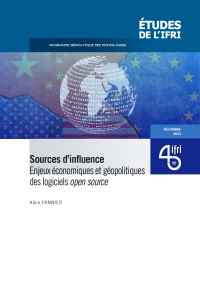Image: Ifri
Ifri (French Institute for International Relations) has published a study, “Sources d’influence. Economic and geopolitical issues of open source software” (in French and in English).
Governments concerned about cybersecurity
In her summary, the author, Alice Pannier, researcher and head of the Geopolitics of Technologies program at Ifri, explains:
“Open source holds a central place in software: it is the foundation of critical software bricks, and has become a decisive element in the innovation processes of digital companies. It is also an attractive alternative to proprietary solutions.
However, open source can be a victim of its own success and suffers from a lack of means dedicated to its maintenance. However, vulnerabilities in open source codes can have serious consequences, as illustrated by the “Log4Shell” flaw revealed in December 2021.
Private companies invest financially and human resources in the development and maintenance of the open source ecosystem. However, this involvement is not without danger for the open source ecosystem, which is increasingly shaped by the private interests of Big Tech.
At the same time, governments are increasingly concerned about the cybersecurity risks of open source, due to accidental vulnerabilities, but also code manipulation by criminals and foreign agents.”
The study addresses three cases in particular, the United States (focused on cybersecurity, with a response centered on preventive measures within the federal administration, and on public-private cooperation), China (desiring to win in influence and independence, it has more and more open source software developers, on GitHub and on Chinese platforms, and Europe.
Articulating the European vision with EU diplomacy
In our continent, observes Alice Pannier, “the European vision of the OS and the political initiatives in progress are based on the historic role of Europeans in open source, the notion of “digital commons” within which in part the OS, and the ambition of European digital sovereignty, to which the OS contributes.”
In her conclusion, the author considers that “the European vision must be articulated with the diplomatic positions of the EU. There are certainly avenues for cooperation with the United States and other countries in areas where both state priorities and the interests of open source communities converge, such as the inventory and maintenance of critical OS components. Conversely, China is sometimes referred to as a possible “objective ally” of the EU in certain areas of open source, such as processors. If China shares the European objective of greater autonomy in the face of Big Tech proprietary solutions, the turn taken by the Chinese government cannot make it a political ally of European ambition. On the other hand, there is a real opportunity for Europe to reach out to partners, not only the United States but also India and Brazil, who could join and help promote this vision of preserving the commons. technologies and an open, interoperable, freedom-respecting and human-centred internet.”
In a column in Le Monde, which takes up the themes of her study, Alice Pannier observes:
“Europe’s less secure approach and the richness of its pool of contributors now make it an increasingly important player in global open source, as shown by the recent relocations of American foundations to Europe (Linux , Eclipse, RISC-V), partly motivated by a desire to escape potential US restrictions on open source software.
The European Union and its Member States therefore have a role to play in mitigating the risks of centralization and fragmentation of this ecosystem. Europe has put in place financial support mechanisms for open source which must be strengthened. The preservation of a global ecosystem could also be the subject of diplomatic initiatives.
Read also
The Linux Foundation crosses the Atlantic – September 29, 2022
Europe wants to promote digital commons – 23 June 2022
The Eclipse Foundation migrates to Europe and settles in Brussels – May 12, 2020
Free software, an instrument to restore Europe’s digital sovereignty – March 17, 2019
